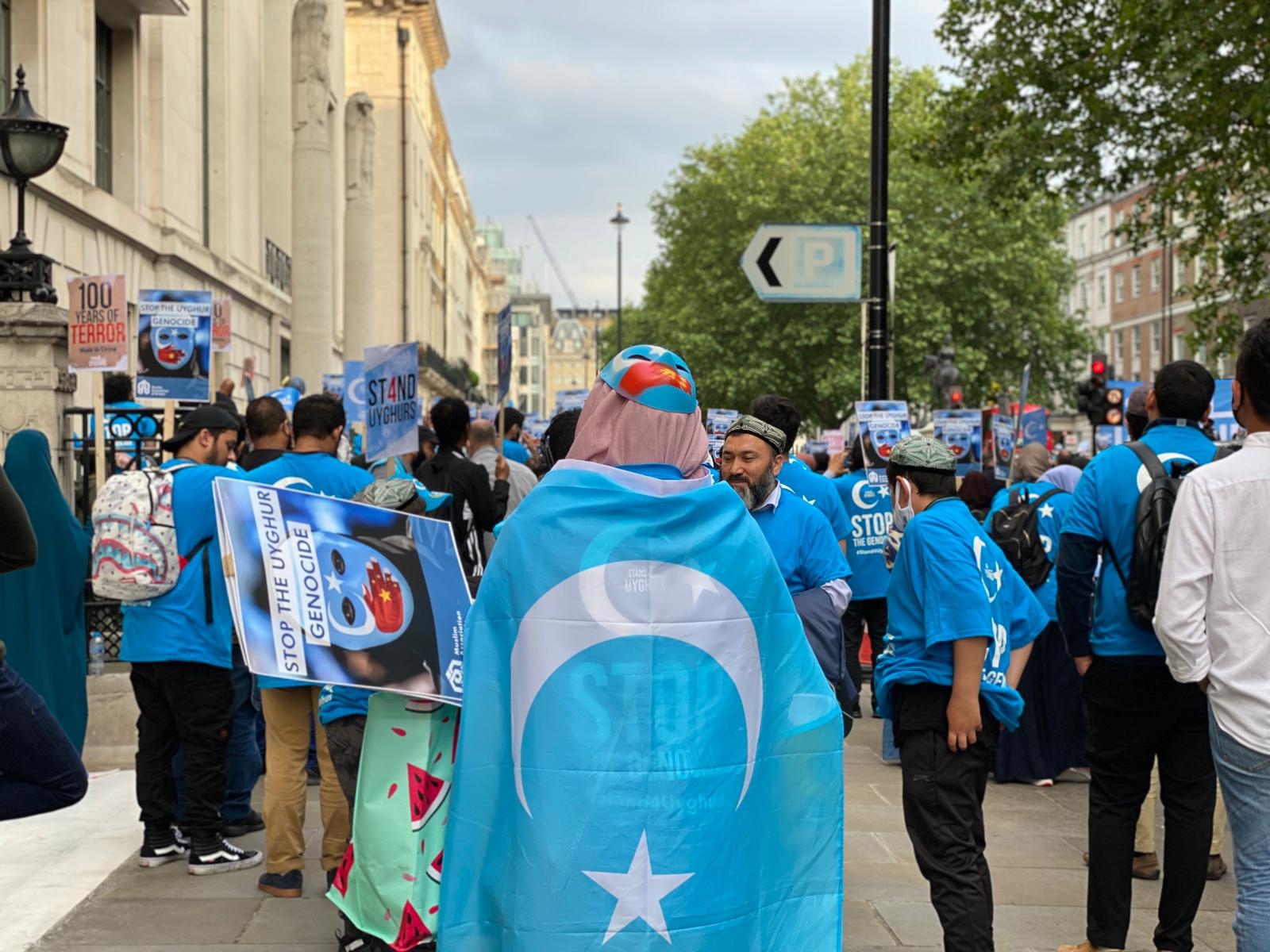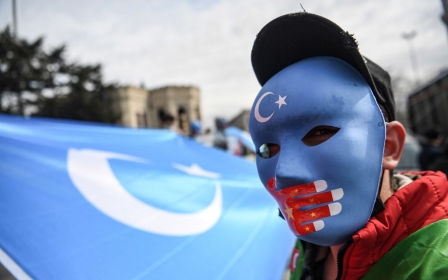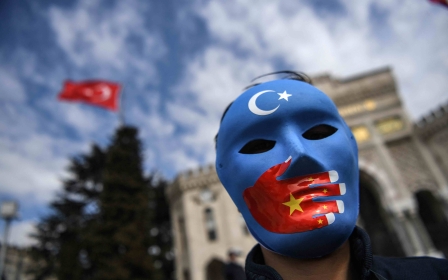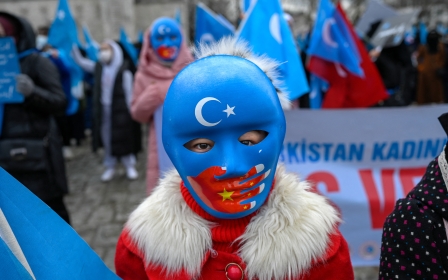Hundreds rally outside Chinese embassy in UK over plight of Uighurs

Hundreds of protesters rallied outside the Chinese embassy in the United Kingdom capital on Thursday to condemn Beijing's treatment of the Uighur Muslim minority, as China marked the 100-year anniversary of its Communist Party.
Among them was Asiya, a Uighur Muslim who sought refuge in Britain and asked that her real name not be used. She held a placard and wore a baby-blue t-shirt emblazoned with the slogan "Stand4Uyghur".
"We come here every month to hold a symbolic protest against China outside the embassy, and there are only maybe twenty people," she told MEE.
"But to see hundreds of people standing up for my Uighur brothers and sisters, it gives me great joy and hope that our oppression will end."
Organised by a coalition of more than 50 Muslim organisations - including the East London Mosque, the Federation of Student Islamic Societies and CAGE, an independent organisation that calls for due process and end to injustices in the "war on terror" - protesters rallied against China's detention of at least one million Uighurs.
New MEE newsletter: Jerusalem Dispatch
Sign up to get the latest insights and analysis on Israel-Palestine, alongside Turkey Unpacked and other MEE newsletters
"I haven't seen my mother since leaving China in 2010, and if I call [my family], I am worried that the Chinese will take them to a re-education camp"
- Asiya, protester
Rights groups say the Uighurs and other mostly Muslim people in China's northwestern Xinjiang region have been incarcerated in "re-education camps" in a bid to root out Islamic customs and forcibly integrate minorities.
Uighurs showing adherence to Islamic customs - including praying, fasting, abstaining from alcohol, growing a beard or wearing Islamic clothing - have been detained by authorities.
In September, a report found that China had built 380 prison camps to detain Uighur Muslims. An earlier report, by China scholar Adrian Zenz, claimed China was sterilising Uighur women and imprisoning thousands of Muslims.
Chinese authorities have rejected any allegations of wrongdoing in Xinjiang, calling the camps "vocational training schools", adding they had been set up to tackle "religious extremism".
Last year, an investigation by the Associated Press found a "climate of terror" was being created around having children, with Uighurs reporting being threatened with detention in internment camps for having too many children.
The investigation also found an unprecedented and dramatic drop in birth rates had taken place, transforming the population dynamic of the Xinjiang province from one of China's fastest-growing regions into its slowest. Evidence shows hefty fines were also put in place for the violation of family planning laws.
'Stand against the CCP'
Jonathan, a Chinese student from Hong Kong who came to show his support for the protest, said it was "imperative" international Chinese students use their freedoms in Britain to support the Muslim minority.
"The security situation is far worse for people in Xinjiang than it is in Hong Kong," said Jonathan, who also asked that his real name not be used.
Adjusting his sunglasses and mask, he told MEE: "We came to the UK to maintain our freedom of speech, and we should use that freedom to stand against the CCP and everything they are doing to the Uighurs."
For now, Asiya, despite living thousands of miles away from China, fears for her safety and that of those around her.
Hailing from the city of Urumqi, the capital of the Xinjiang Uighur region, Asiya left China in 2003 to study in Japan. The last time she visited her hometown was in 2010.
But after a crackdown, she fled China and watched from afar as Beijing rounded up her friends and relatives and took them to the so-called "re-education camps".
"I haven't seen my mother since leaving China in 2010, and if I call [my family], I am worried that the Chinese will take them to a re-education camp," she said.
The US, Canadian and Dutch parliaments have labelled Beijing's actions against the Uighurs a "genocide", with Washington imposing sanctions on several Chinese officials.
China has rejected the genocide charge and warned Western countries not to interfere in its internal affairs.
Middle East Eye delivers independent and unrivalled coverage and analysis of the Middle East, North Africa and beyond. To learn more about republishing this content and the associated fees, please fill out this form. More about MEE can be found here.





